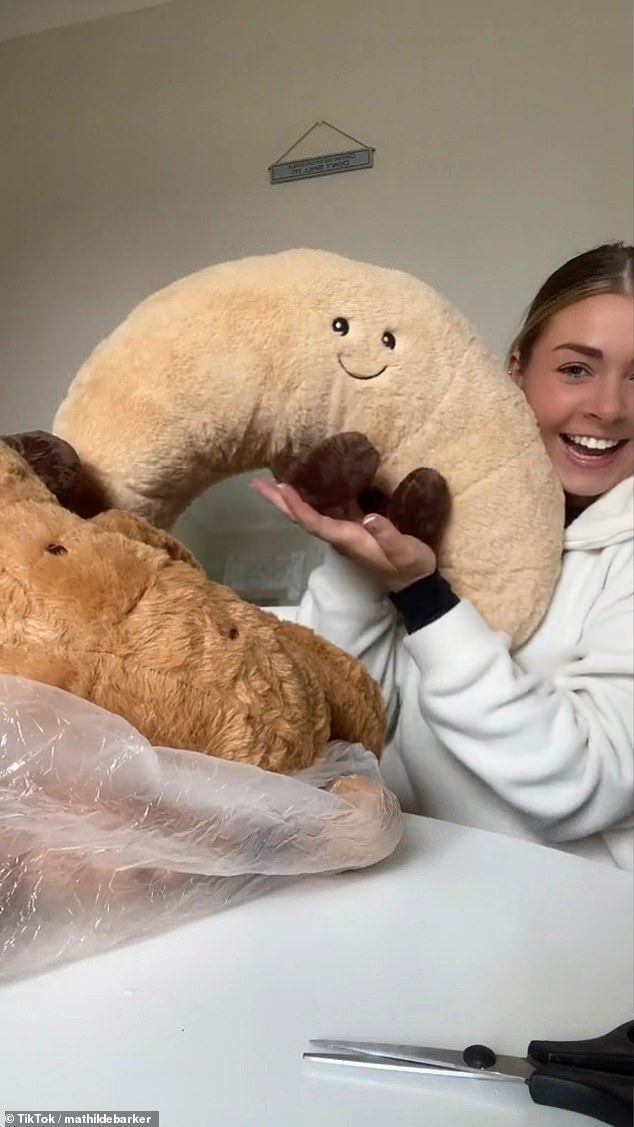A British woman is spending thousands of pounds on a soft toy trend that has taken the internet by storm.
Jellycats, a British toy company, was founded by brothers Thomas and William Gatacre in 1999, around the same time that American entrepreneur Ty Warner introduced the world to Beanie Babies, which became the world’s first internet sensation.
Nearly three decades later, videos of women finding, unboxing and appreciating their expensive Jellycats (available in a dizzying array of shapes, characters and objects) are flooding TikTok, making these plush toys the world’s newest online craze.
“Sometimes you just need a giant Jellycat,” one TikTok user captioned a video of her dancing with a Silver Bashful Bunny, estimated to be worth £225.
Several creators have posted their purchases or shared clips of themselves unwrapping these plushies on social media, with hundreds of thousands of posts under the hashtag #Jellycat on TikTok and Instagram.
In fact, a Jellycat could represent one of many things. From foods and drinks like the ‘Toastie Vivacious Red Eggplant’ and the ‘Sassy Sushi Egg’, to farm animals like the ‘Cluny Cockerel’, fantastical creatures like the ‘Lavender Dragon’ and everyday objects like coffee cups and salt and pepper shakers .
Their creators bring these Jellycats to life by giving them personality traits, like “Amuseable” or “Bashful,” or quirky names like “Fergus Frog” or “Isobel Chihuahua.”
And, at the time of writing, most Jellycats, which normally cost between £12 and £200, are out of stock.
Beanie Babies may soon be dethroned as the world’s most collectible plush toy in the face of the rise of the Jellycat. A TikTok user shows off her collection in an image from one of her previous posts.
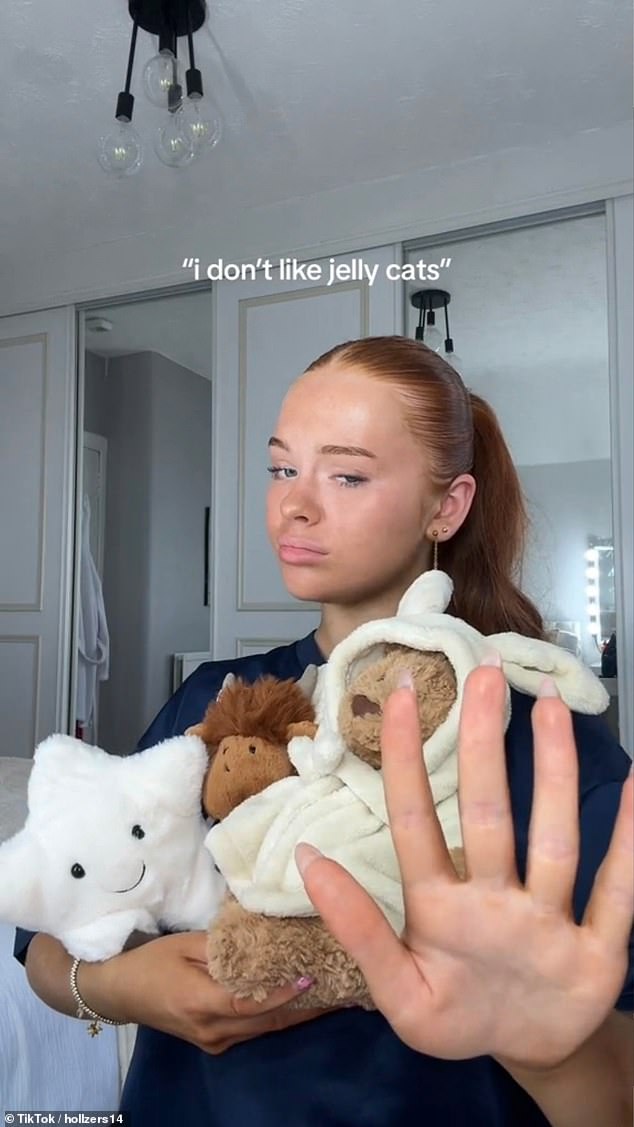
Nearly three decades since Jellycat began making its signature toys, videos of women finding, unboxing and appreciating their expensive plush toys, available in a dizzying variety of shapes, characters and objects, are flooding TikTok.
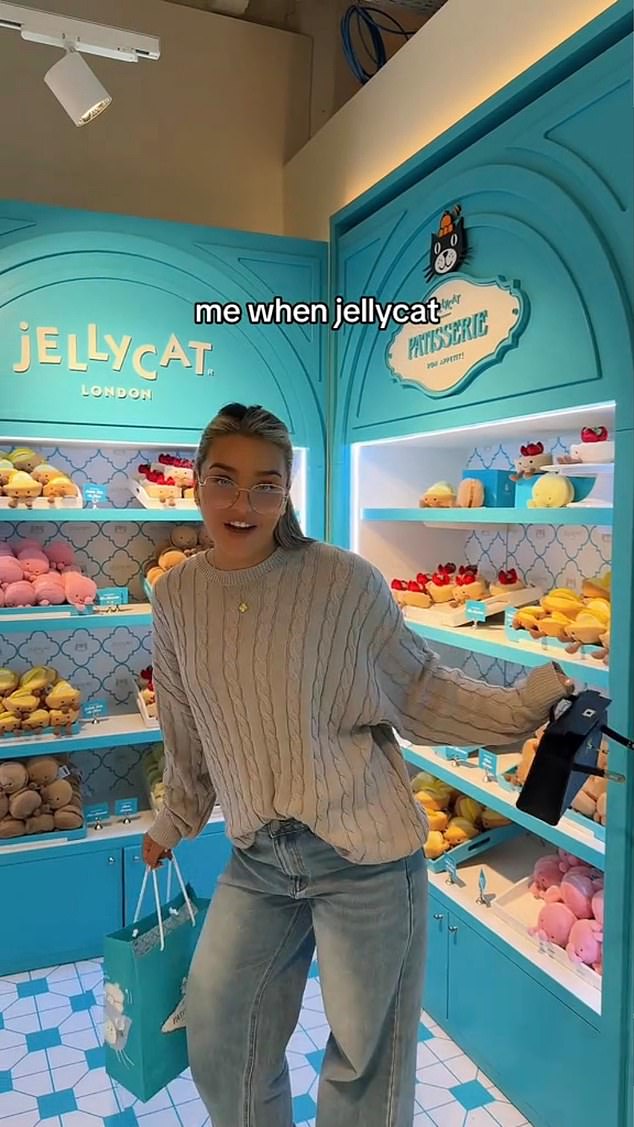
Sales of Jellycats at Selfridges are up 215 per cent, according to The Telegraph
Over the past two years, Jellycats’ popularity has surged among millennials and Gen Z shoppers, and Glimpse estimates a whopping 135 percent increase in interest in the brand by 2024.
According to Jellycat’s latest filing with Companies House, revenue rose 37 per cent to £200 million in the 12 months to December 31, 2023, with pre-tax profit rising 24 per cent to £67 million.
In addition to the high quality of its luxury products, Jellycat’s market value has also been bolstered by its celebrity clientele, including Princess Charlotte, proud owner of a Fuddlewuddle dog, Kylie Jenner, who endorsed the brand and its line of ‘Vivacious’. ‘vegetable toys in 2020, and ‘big, big Jellycat customer’ Bill Nighy.
The surge in demand has resulted in crazy auctions on resale websites like eBay, where resellers list rare, limited-edition plushies that have since been recalled by the toymaker for eye-watering sums running into the thousands.
The brand’s limited edition three-piece collaboration from Harrod’s, including Cheryl Cherry Cake, Seb Teacup and Vicky Teapot, is advertised for £239.99 “or best offer” on the site at the time of writing .
The three-tier plush cake originally sold for £44.95, according to London World, and quickly sold out.
A special edition of one of Jellycat’s most popular releases, Bashful Bunny, is priced at £2,350.
As justification for the exorbitant price, its advertiser writes: ‘Dixie was part of the 2014 ‘Safari Sensation’ limited edition and is now a highly desired retired collectible. It has never been played with, just displayed.
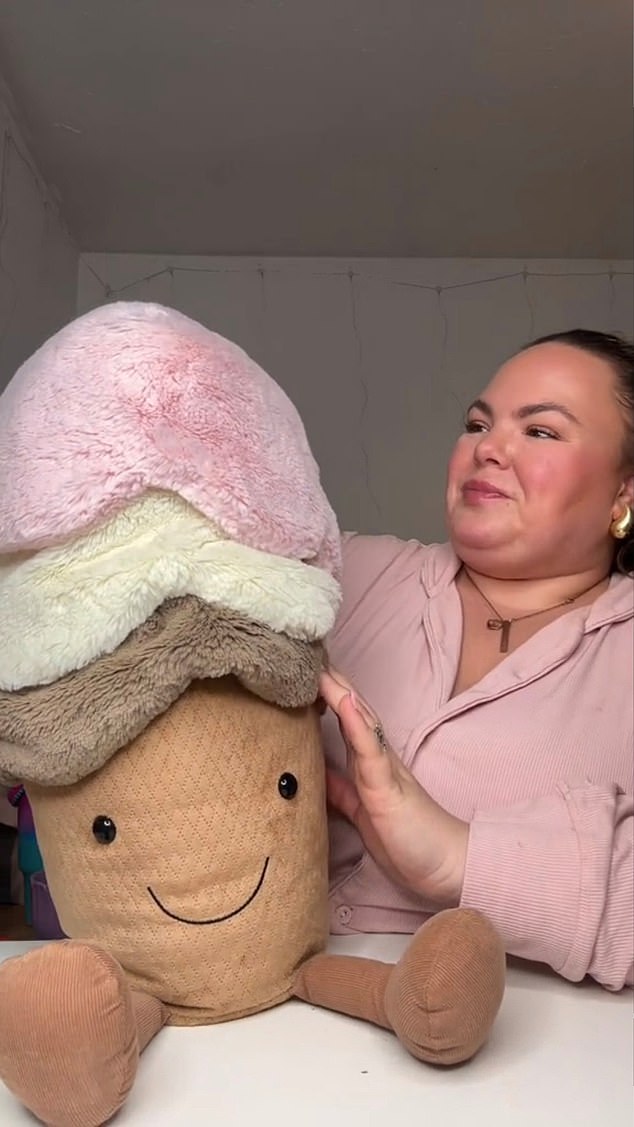
TikTok creator reveals she found a discontinued Jellycat for £490 on a resale website
‘The bunny itself is in excellent condition and still has the two original paper tags attached to his ears. Extremely rare and difficult to find in this condition.
“This Jellycat was £490,” a TikTok creator, who goes by @meggoldberger, tells her followers in a video titled “The Most Expensive Jellycat I’ve Ever Bought (To Date),” indicating that she has no plans to stop collecting. Rare Jellycats.
“It was originally £490 including postage and packaging,” he continues, holding up a toy wrapped in a pink case.
The creator then reveals how she waited for the seller to drop the price to £1,430 until she could afford her latest Jellycat, before adding that she paid for it with her winnings on Vinted, the internet’s favorite online ‘thrift store’.
Finally, it presents its latest acquisition as the Jellycat ‘Amuseable Ice Cream’ ‘in a huge size’ that features a soft waffle cone and an ‘ice cream hat’ layered with strawberry, vanilla and chocolate flavours.
A Jellycat collector said The telegraph “These resale prices are a joke,” while commenting that resellers buy Jellycat shares to capitalize on the brand’s enormous popularity.
Speaking to the newspaper, Nicola Kent, owner of a Kent-based toy store, said: “Jellycat also keeps supply very tight, and die-hard fans know that if they don’t buy the lines when they are launched, they may not get a second chance”.
“Unfortunately, there are customers taking advantage of the shortage and purchasing to resell at grossly inflated prices on auction sites.”
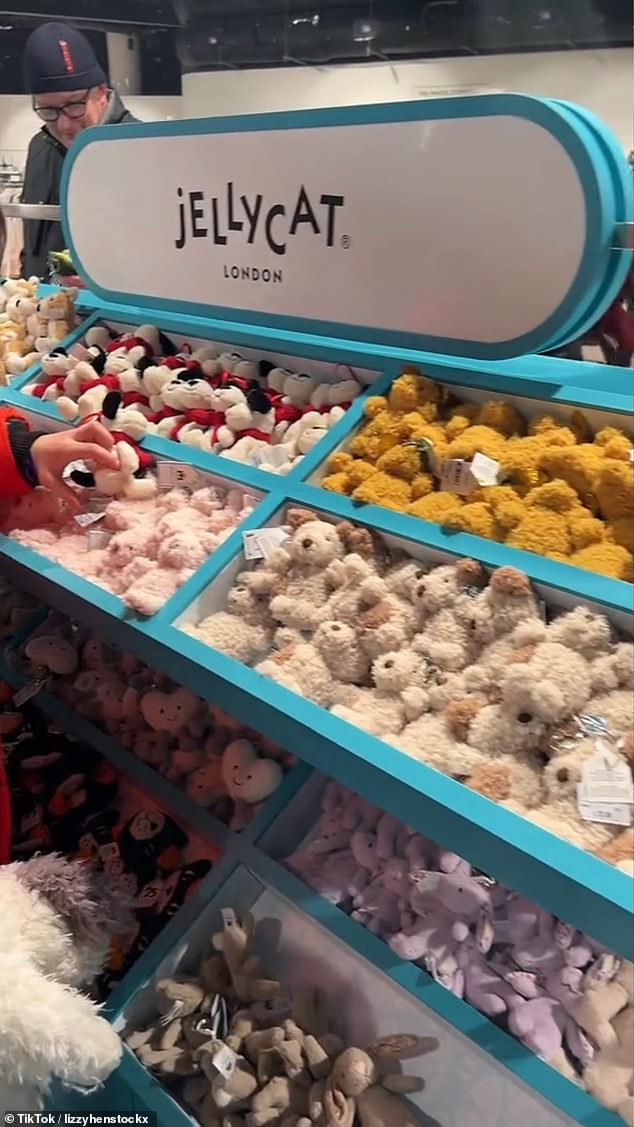
A range of Jellycats on display
Jellycats’ booming resale market is “upsetting a lot of people,” one enthusiast added, speaking specifically to how quickly Harrod’s Cheryl Cherry Cake disappeared from shelves after its launch.
The times money mentor It recently evaluated whether Jellycats are worth investing in, with the outlet noting that “their popularity as a collector’s item means that if you pick the right toy and treat it right, you could end up selling them for much more than you bought them for.” .
Like Beanie Babies, a children’s toy that became popular with people of all ages, with some variants such as Princess Diana’s beanie bear and the cockatoo beanie named Ty, earning six-figure prices on auction sites. .
In an interview with the sunToy and game expert Peter Jenkinson has selected the Jellycats he believes will see the biggest return on investment in the years to come.
He picked Snowdragon, Sandcastle, Fish and Chips and Bartholomew Bear Backpack as the designs most likely to generate a decent return, adding: “It’s always better to keep the label if you want to maintain some value.”
But for a large number of the brand’s adult consumers, a Jellycat is much more than just a piggy bank.
For some, it is a source of comfort or an antidote to their anxieties, while other adults seek out high-quality stuffed toys for their aesthetic value.
Dorset collector Nell Richards, 40, owner of 23 Jellycats, said the guardian suffers from severe anxiety after leaving an abusive relationship.
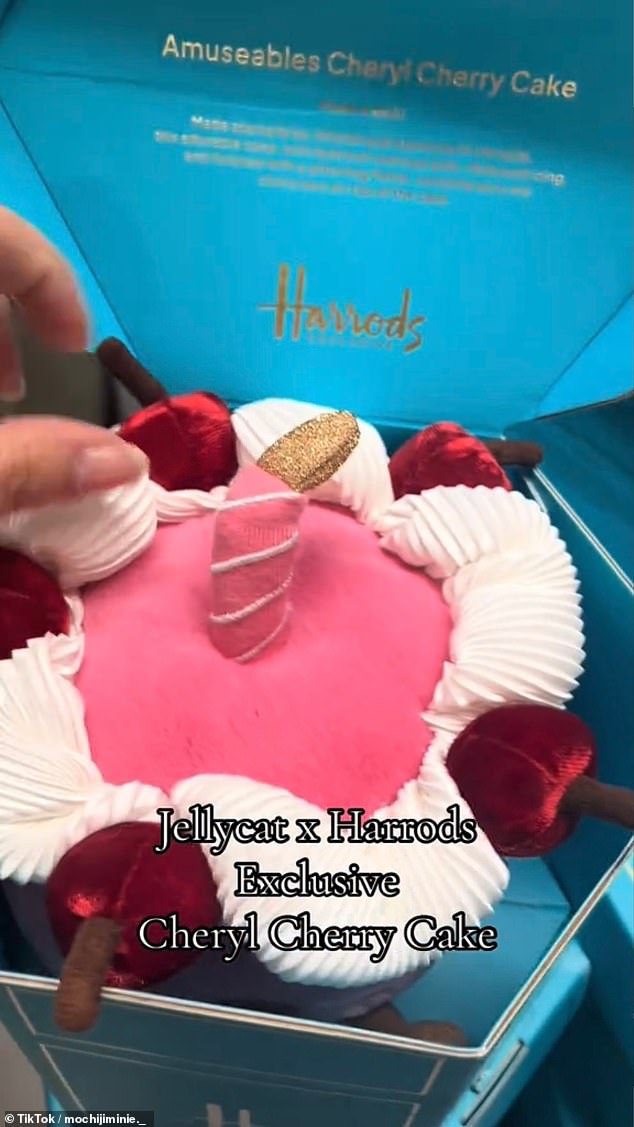
The brand’s limited edition three-piece collaboration from Harrod’s, featuring Cheryl Cherry Cake, Seb Teacup and Vicky Teapot, is advertised for £239.99 “or best offer” on the site at the time of writing .
Richards, who was left paralyzed on one side after suffering two strokes, told the newspaper: “They help me with my anxiety.” If I’m anxious, I sit in my bed with them. I like to pet the rabbit’s ears, it softens things.’
Reflecting on its appeal in a recent article, Financial Times columnist and 100 Jellycats owner Freya Rogers wrote: ‘It seems that no matter the location, Jellycat exudes a kind of magic that keeps us coming back for more; Could that magic lie in something as simple as joy?
Others have suggested that the Jellycat’s new popularity is due to “good quality, super soft fur and nice designs.”
One Reddit user also highlighted the growing Jellycat community as another big draw, writing: ‘I love being a part of it and sharing my thoughts and photos with people. See their joy.’
Others have taken to X, formerly Twitter, to express their love for the toys.
One of them said: “Girlhood is looking at the Jellycat website together.”
A second added: “For therapy, I’ll scroll through the entire Jellycat website and take screenshots of the ones I like.”
A third wrote: “I can’t stop thinking about starting a Jellycat collection.”
A fourth said: “Needing the Jellycat burger is the only thing I’m sure about in life.”


